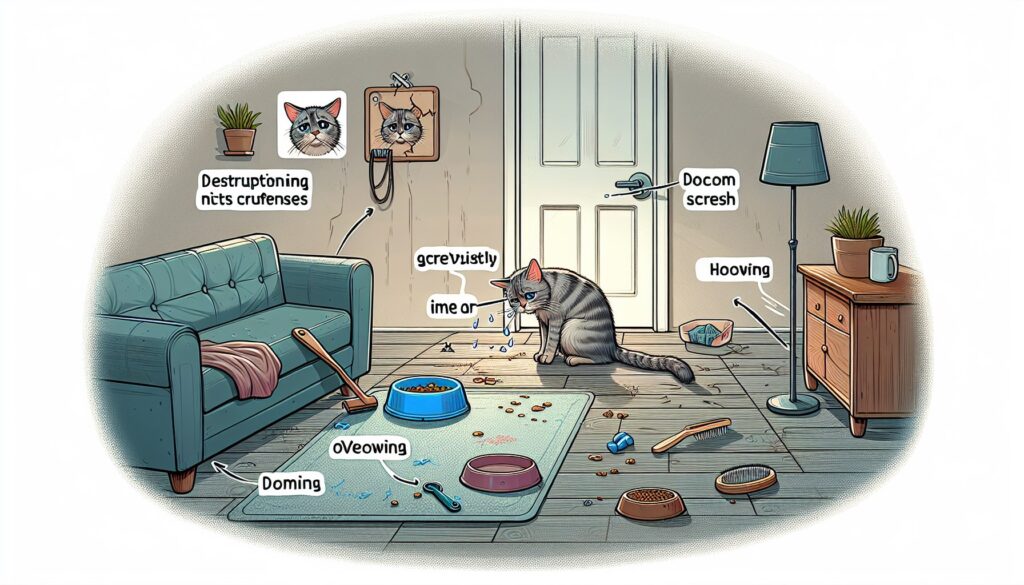
The Unseen Heartbreak: Do Cats Get Sad When You Leave?
Have you ever wondered what your cat feels when you walk out the door? While dogs have long been celebrated for their loyalty and emotional depth, cats often get typecast as aloof and independent creatures. However, recent studies and countless anecdotal experiences suggest that cats, too, can experience sadness when their human companions leave. This article delves into the emotional lives of cats, exploring whether they truly get sad when left alone and what you can do to alleviate their loneliness.
The Myth of the Independent Cat
Cats have a reputation for being solitary animals. Unlike dogs, who have historically lived in packs and formed close bonds with humans, cats were domesticated relatively recently in human history. This has led many to believe that cats are more self-sufficient and less emotionally attached to their owners. But is this really the case?
While it’s true that cats can be more independent than dogs, this doesn’t mean they don’t form strong emotional bonds with their human companions. In fact, a study published in the journal Current Biology found that cats exhibit attachment behaviors similar to those seen in dogs and even human infants. The study showed that 64% of cats were securely attached to their owners, demonstrating signs of distress when separated and joy upon reunion.
Signs Your Cat Misses You
Cats may not wag their tails or jump up and down when you come home, but they have their own ways of showing affection and sadness. Here are some signs that your cat may be feeling lonely or sad when you leave:
- Excessive Meowing: Cats are generally quiet creatures. If your cat starts meowing excessively when you’re about to leave or after you’ve left, it could be a sign of distress.
- Destructive Behavior: Scratching furniture or knocking over objects can be a way for your cat to express frustration or anxiety.
- Changes in Appetite: A sudden loss of appetite or overeating can indicate emotional distress.
- Lethargy: If your usually active cat becomes unusually lethargic, it could be a sign of depression.
- Over-Grooming: Cats groom themselves to soothe anxiety. Over-grooming can lead to bald spots and skin issues, signaling that your cat is stressed.
The Science Behind Feline Emotions
While we can’t ask cats how they feel directly, scientific research offers valuable insights into their emotional lives. Cats have complex brains with structures similar to those found in humans and other mammals, including areas responsible for emotions like love and fear.
Research has shown that cats produce oxytocin, often referred to as the “love hormone,” when they interact with their owners. This hormone plays a crucial role in social bonding and emotional attachment. When you leave, the sudden absence of oxytocin could contribute to feelings of loneliness and sadness in your cat.
How Long is Too Long?
One common question cat owners have is how long it’s okay to leave their feline friends alone. While every cat is different, most experts agree that adult cats can be left alone for up to 24-48 hours as long as they have access to food, water, and a clean litter box. However, kittens and elderly cats may require more frequent attention.
If you need to be away for longer periods, consider asking a friend or family member to check on your cat or hiring a professional pet sitter. This ensures that your cat receives the social interaction and care it needs.
Strategies to Alleviate Loneliness
Knowing that your cat can feel sad when you’re gone might make leaving home even more challenging. Fortunately, there are several strategies you can employ to make your absence less stressful for your feline friend:
- Interactive Toys: Invest in toys that keep your cat mentally stimulated while you’re away. Puzzle feeders and automated toys can provide entertainment and exercise.
- Comfort Items: Leave out items that smell like you, such as worn clothing or bedding. Familiar scents can provide comfort and reduce anxiety.
- Window Perches: Cats love observing the outside world. A window perch can provide hours of entertainment as they watch birds, squirrels, and passersby.
- Companion Pets: If feasible, consider getting another pet for companionship. Another cat or even a dog (if properly introduced) can provide social interaction.
- Routine: Cats are creatures of habit. Try to maintain a consistent routine for feeding, playtime, and grooming even when you’re away.
The Importance of Quality Time
While it’s essential to make provisions for your cat’s well-being during your absence, nothing replaces quality time spent together. Make an effort to engage with your cat when you’re home through play, grooming, and simply being present.
Interactive play sessions using toys like feather wands or laser pointers can strengthen your bond and provide much-needed exercise for your cat. Grooming sessions not only help keep your cat’s coat healthy but also serve as an excellent opportunity for bonding.
Do Cats Get Sad When You Leave?
In conclusion, while cats may not show their emotions as overtly as dogs do, they are far from indifferent creatures. They form deep emotional bonds with their human companions and can indeed feel sad when left alone. By understanding the signs of feline loneliness and taking proactive steps to ensure their well-being, you can help alleviate the heartache your furry friend might experience during your absence.
So next time you walk out the door, remember that your departure doesn’t go unnoticed by those watchful eyes peeking through the window blinds. Your cat misses you more than you might think—so make every moment together count.
FAQs
Do cats get sad when you leave?
Yes, cats can feel sad when their human companions leave. They may show signs of distress such as excessive meowing, destructive behavior, and changes in appetite.
How long can a cat be left alone?
Most adult cats can be left alone for 24-48 hours as long as they have access to food, water, and a clean litter box. Kittens and elderly cats may require more frequent attention.
What are some signs that my cat misses me?
Signs that your cat misses you include excessive meowing, destructive behavior, changes in appetite, lethargy, and over-grooming.
How can I help my cat feel less lonely when I’m gone?
To help your cat feel less lonely, provide interactive toys, comfort items with your scent, window perches, and consider getting a companion pet. Maintaining a consistent routine is also beneficial.
Do cats form strong bonds with their owners?
Yes, cats can form strong emotional bonds with their owners. Studies have shown that cats exhibit attachment behaviors similar to those seen in dogs and human infants.
What should I do if I need to leave my cat alone for an extended period?
If you need to leave your cat alone for an extended period, consider asking a friend or family member to check on them or hiring a professional pet sitter to ensure they receive the necessary care and social interaction.
Conclusion
In acknowledging the emotional depth of our feline friends, we not only enhance our understanding of these enigmatic creatures but also enrich our relationships with them. After all, every goodbye should come with the promise of a joyful reunion—a sentiment both humans and cats can appreciate deeply.

